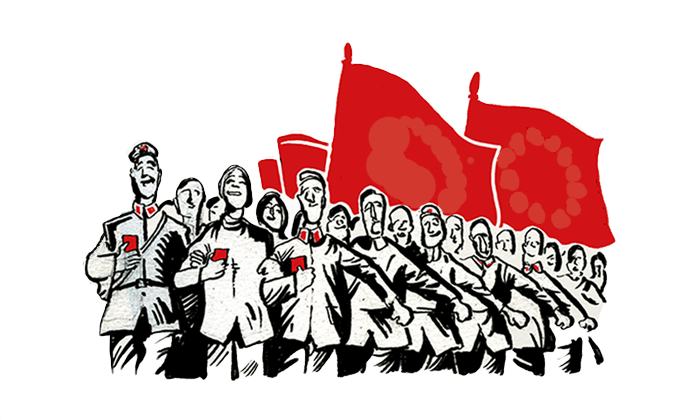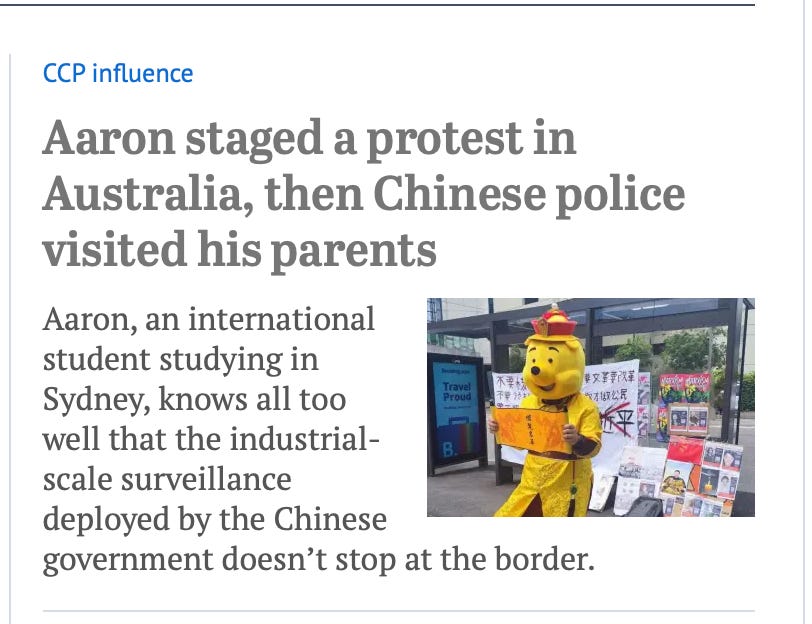2024 preparedness China & West
Imperial warrior elites clampdown on fragmented troubadours..
Reminders that the UK and USA should really be following the example of Sweden, Israel and other countries closer to frontlines … preparing for the (almost) inevitable. Some of the intellectual indiscipline in Western elite universities and an inability of parents and teenagers to control addictions to depression-inducing social media could be partly mitigated by mandatory military drills for school pupils aged 12 to 15?
UK conscription?
First the old news, a report earlier this year by a European paper, Le Monde, and front page news in the UK dailies.
Debate grows on the revival of conscription in the UK, by Cécile Ducourtieux, February 2, 2024
Should the British be preparing for war? This troubling question was posed bluntly by General Patrick Sanders, the army's chief of the general staff, a few days ago. During a speech in London on January 24, he argued that the UK should form "a citizen army" in the event of open conflict between NATO and Russia. This statement by a general near the end of his career – he will be retiring next summer – has sparked an unprecedented debate in a country that ended conscription in 1960.
Sanders argued that the UK should follow the Swedish example and take "preparatory steps to enable placing our societies on a war footing," adding that such action is "not merely desirable, but essential". Sweden recently reintroduced a form of military service. Downing Street has denied that it is working on such a scenario …
… Despite these denials, General Sanders' comments have been echoed by Richard Shirreff, NATO's former deputy commander-in-chief, and a Brit, who said the time had come to "think the unthinkable" even if "Britain's armed forces have traditionally and culturally relied on long service volunteer highly professional soldiers with huge experience, and that is really the way we would all want it to go on".
… Former prime minister Boris Johnson has … said he would be ready to sign up. "Would I sign up to fight for king and country? Yes, Sah!" he claimed …
RUSI last week suggested a better plan
[Royal United Services Institute (RUSI) is the world’s oldest and the UK’s leading defence and security think tank.]
Conscription in the UK: A National Disservice? by Dr Sidharth Kaushal and Paul O’Neill, 2 May 2024
… While conscription can ensure that society understands the threats and people know their responsibilities in the event of conflict, this is arguably an educational issue and not a reason for mandating national service. Moreover, the Scandinavian countries whose model of conscription so many admire have other structures in place that support whole-of-society approaches, including clear plans for industry, civil society and citizens, most of which are missing from the UK. So, expecting a single lever (conscription) to solve a systemic issue (the relationship between government, society and armed forces) is unwise. And arguably, conscription reduces a government’s freedom of action as society becomes more interested in when its youth has to be mobilised and could subject foreign policy choices to greater scrutiny than otherwise would be the case.
While conscription may not be the answer, General Sir Patrick’s demand for armed forces at a size matching the threats the UK faces is correct. However, the economy will not sustain standing regular forces of the scale needed; hence, alternatives are needed. One is to engage the whole of society in resilience, as Finland’s Security Committee (Turvaillisuuskomitea) does. This would go beyond the usual security departments involved in developing a National Defence Plan to include education, energy, food, justice and so on in a holistic strengthening national resilience. While a society more aware of the threats may be more amenable to joining the armed forces, a cost-effective way to strengthen the armed forces’ actual capability would be to expand the UK’s reserves, which would also strengthen connections with society. The US, Canadian and Australian armed forces maintain much higher percentages of reserves to regulars: the UK’s Reserves are less than 40% the size of the British Army, compared to 105% in the US, 95% in Canada and 70% in Australia. Reserves are also 10% of the size of the regular Royal Navy and Royal Air Force, while the equivalent figures for the US, Canada and Australia respectively are 16%, 48% and 28% for the navy and 53%, 17% and 45% for the air force.
Just as for regular servicepeople in the UK, Reserve outflow exceeds the inflow, which the External Scrutiny Team described as representing ‘a real risk of a tangible decline in the health, and thus capability, of our Reserve’. … An investment in the UK’s Reserves, therefore, makes sense as an initial step, but requires dedicated funding along the lines of the Future Reserves 2020 Programme, which was not the case for the more recent Reserve Forces 2030 Study.
Should mobilisation be necessary, the first step should be the strategic reserve. This is likely to form part of the third echelon, and potentially part of the second echelon given limited capacity in the volunteer reserve. The armed forces recognise the need to rebuild the utility of the strategic reserve, which has declined since the Cold War. As it comprises ex-regulars who retain a liability for being mobilised in extremis, growth could come through regular forces outflow. Reducing the focus on retaining regulars and accepting that typical careers will be shorter – at least for those where the cost of replacement is low – would increase the numbers with military experience in society, and raise the skills baseline from which mobilised persons would be drawn. Both Ukraine and Russia were able to bring trained personnel to the front quickly. It is also closer to the US model where shorter service is more prevalent, especially in the US Marine Corps, which remains well-staffed and has high standing in US society. …
What is happening in China?
A few days ago longtime China watcher Ian Williams (currently enrolled for a PhD at the formidable King’s College London) reported at The Spectator on preparations in the country (or empire) which we know from our histories on Social Science Files is likely to remain “permanently totalitarian” into the future.
Chinese society is rapidly militarising, by Ian Williams, 12 May 2024, by Ian Williams for The Spectator, 12 May 2024
The reports in China’s state media speak about ‘advancing national defence education in the new era’, teaching students to be ‘disciplined’, and ‘promoting the spirit of hard work and inspiring patriotism’. But behind the stultifying Communist party jargon is a new law that will force school children to undergo miliary training and which marks another step towards a militarisation of Chinese society on a scale not seen since the days of Mao Zedong.
The revised ‘law on national defence education’, now before China’s rubber-stamp parliament, proposes mandatory military drills for middle school pupils aged 12 to 15 and says that defence should be studied even at primary school. Ritualised military-style exercises are not unusual in China’s schools and colleges, but enforcement has typically been patchy and perfunctory …
… The revised law … coincides with yet another reorganisation at the top of the military, with President Xi Jinping last month announcing changes that give a greater emphasis to information and cyber warfare. But it also comes at a time of a growing obsession with security that is extending into Chinese workplaces and local communities.
Chinese companies have been setting up their own volunteer armies – workplace militias not widely seen since the 1970s. An analysis by CNN of state media reports identified at least 16 major Chinese firms, including a privately-owned dairy outfit, that have created militias over the past year. The units go by the official name of People’s Armed Forces Departments and appear to be a reserve force. Officials are encouraging their formation, with militias also hosted by property companies, utility firms and banks. The Industrial and Commercial Bank of China, a giant state-owned lender, has organised a militia, replete with uniforms, training facilities and a warehouse for storing weapons, according to local media in Qinghai. …
Last year a new counter-espionage law took effect in China, which is so sweeping that it could be used to cover just about any activity the CCP deems threatening to its elastic definition of ‘national security’. Foreign businesses have been particularly alarmed by provisions that appear to criminalise the transfer out of the country of what has hitherto been regarded as routine business and market information. The law is typically vague but appears to allow authorities to gain access on demand to data, electronic equipment, and all manner of information.
The adoption of the law was accompanied by efforts to mobilise the public against ‘spying’. The Ministry of State Security, China’s main intelligence agency, has been encouraging citizens to report suspicious behaviour on its website or via a new phone hotline. It also extended its definition of illegal behaviour to include criticism of China’s wobbly economy. Late last year it accused unnamed saboteurs of seeking to ‘profit from turmoil’ and of trying to ‘shake investment confidence and cause financial instability in the country.’ The ministry declared that ‘finance is an important part of national security.’ Expressing anything less than economic optimism is now deemed a threat.
All of which raises the intriguing question of who the intended target is. … What can be said with some degree of certainty is that Xi sees enemies everywhere, and that his paranoia is being played out from the school playground to the factory floor in a manner not seen since the dark days of Mao.
WSJ reports on the sad fate of the troubadours in Hong Kong
Could this be why my Google website has in past month experienced an inexplicable surge of visits from Hong Kong (eventually followed by a surge of visits from China)?
YouTube Says It Will Block Protest Song in Hong Kong: Move to ban the distribution of ‘Glory to Hong Kong’ adds to fears of declining free speech as authorities carry out a campaign against dissent, by Austin Ramzy, May 15, 2024
YouTube said that it would comply with a Hong Kong court ruling that banned the distribution of a protest song in the city, heightening concerns about threats to free speech as the government pursues a sweeping campaign against dissent. …
… “Glory to Hong Kong” was a popular anthem during the protest movement that began in 2019, when millions took to the streets to oppose extraditions to mainland China. The movement grew into broader calls for democratic rights but was crushed by authorities wielding a sweeping security law imposed on the city by Beijing in 2020.
The song was informally called Hong Kong’s national anthem, although it had no such official designation. That led to some confusion, including incidents in 2022 when it was played for Hong Kong athletes at international competitions. …
… The Hong Kong police arrested some people for playing the song in public. A court also ruled in 2021 that a protest slogan in its lyrics amounted to a call for independence from China, which is illegal under the security law. …
… An appeals court sided with the government last week, writing that “prosecutions alone are clearly not adequate to tackle the acute criminal problems”. ….
A screen shot from the front page of the Sydney Morning Herald today.
Finally, a well reviewed book written by two authors from SOAS, which is where I used to teach Southeast Asian politics in the 1990s
Steve Tsang and Olivia Cheung, The Political Thought of Xi Jinping, Oxford University Press 2024
Enthusiastic reviews can be read at the OUP website [click title].
Steve Tsang is Director of the China Institute at SOAS University of London. He is a Fellow of the Academy of Social Sciences and an Emeritus Fellow of St Antony's College at Oxford. Olivia Cheung is Research Fellow of the China Institute at SOAS University of London.
In The Political Thought of Xi Jinping, Steve Tsang and Olivia Cheung provide an authoritative overview of what "Xi Jinping Thought" is and is not and what it means for both China and the world. Xi, now effectively leader for life, has worked to ensure that "Xi Jinping Thought" becomes cemented as the new state ideology. Clearly inspired by the doctrine of "Mao Zedong Thought," which shaped the parameters of acceptable thinking for a quarter century, Xi wants his doctrine to define what he calls the "China Dream of national rejuvenation" and serve the pathway to its fulfilment by 2050. As Xi conceives it, the China Dream is about making China great again, or restoring China to the height of its power, influence, and international standing in the mythical era of grandeur in its long imperial history. Drawing from original research of Xi's speeches, writings, and policies, Tsang and Cheung conceptualize Xi's vision independently from interpretations provided by the Chinese Communist Party or other sources. They further examine and explain how Xi seeks to transform this vision into reality. An authoritative analysis of the leader-driven ideological revolution that is currently transforming China.
My little piece about the China Dream way back in 2013
Maybe this explains the China-based recent interest in my website! It is still worth a read. Here is an extract (first and final paragraphs):
China is not a free society, and has few checks on the hijacking of official historiography by aggressive nationalists. Twisted historical narratives and atavistic posturing in both countries underlie the current tensions over a new air-defence zone in the East China sea. If China extends this protection zone to the South China sea, which it claims as "historical waters", then Southeast Asian history will come into play. The jingoistic Chinese media should pay attention to the proud history of the Chinese commercial diaspora in Southeast Asia dating from the seventeenth century. Chinese nationalists need help in understanding why the 'China Dream' would be more effectively advanced overseas through commerce. …
… European mercantilists and nationalist indigenous rulers fed like parasites on closed Southeast Asian markets, but overseas Chinese nourished -- and tried to open -- those markets with skills and effort. The China Dream, if it is to 'come true' like the American Dream, needs to be founded on free enterprise. Throughout the world Chinese diasporas are synonymous with commercial success. Southeast Asia offers the most important examples with historical relevance today. For example, if China abandoned its territorial claims in Southeast Asia and pursued a cosmopolitan 'free enterprise' dream instead of crude propaganda and militarism, it might recruit Southeast Asian allies … What are a few hard rocks in a sea of soft commerce?
My thanks to the Wall Street Journal, the Spectator, and conservative Condorito
Dr Michael G. Heller










